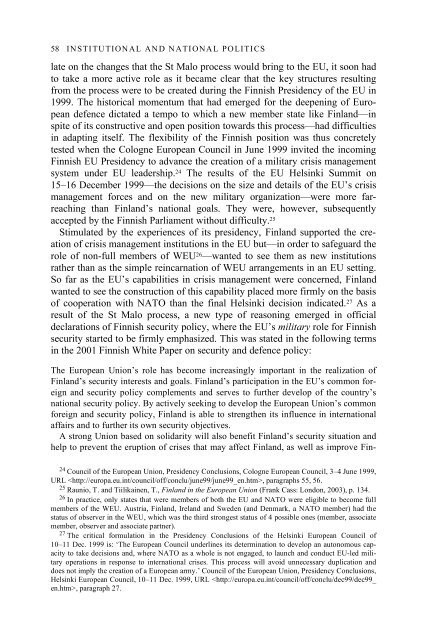The Nordic Countries and the European Security and Defence Policy
The Nordic Countries and the European Security and Defence Policy
The Nordic Countries and the European Security and Defence Policy
- No tags were found...
You also want an ePaper? Increase the reach of your titles
YUMPU automatically turns print PDFs into web optimized ePapers that Google loves.
58 INSTITUTIONAL AND NATIONAL POLITICSlate on <strong>the</strong> changes that <strong>the</strong> St Malo process would bring to <strong>the</strong> EU, it soon hadto take a more active role as it became clear that <strong>the</strong> key structures resultingfrom <strong>the</strong> process were to be created during <strong>the</strong> Finnish Presidency of <strong>the</strong> EU in1999. <strong>The</strong> historical momentum that had emerged for <strong>the</strong> deepening of Europe<strong>and</strong>efence dictated a tempo to which a new member state like Finl<strong>and</strong>—inspite of its constructive <strong>and</strong> open position towards this process—had difficultiesin adapting itself. <strong>The</strong> flexibility of <strong>the</strong> Finnish position was thus concretelytested when <strong>the</strong> Cologne <strong>European</strong> Council in June 1999 invited <strong>the</strong> incomingFinnish EU Presidency to advance <strong>the</strong> creation of a military crisis managementsystem under EU leadership. 24 <strong>The</strong> results of <strong>the</strong> EU Helsinki Summit on15–16 December 1999—<strong>the</strong> decisions on <strong>the</strong> size <strong>and</strong> details of <strong>the</strong> EU’s crisismanagement forces <strong>and</strong> on <strong>the</strong> new military organization—were more farreachingthan Finl<strong>and</strong>’s national goals. <strong>The</strong>y were, however, subsequentlyaccepted by <strong>the</strong> Finnish Parliament without difficulty. 25Stimulated by <strong>the</strong> experiences of its presidency, Finl<strong>and</strong> supported <strong>the</strong> creationof crisis management institutions in <strong>the</strong> EU but—in order to safeguard <strong>the</strong>role of non-full members of WEU 26 —wanted to see <strong>the</strong>m as new institutionsra<strong>the</strong>r than as <strong>the</strong> simple reincarnation of WEU arrangements in an EU setting.So far as <strong>the</strong> EU’s capabilities in crisis management were concerned, Finl<strong>and</strong>wanted to see <strong>the</strong> construction of this capability placed more firmly on <strong>the</strong> basisof cooperation with NATO than <strong>the</strong> final Helsinki decision indicated. 27 As aresult of <strong>the</strong> St Malo process, a new type of reasoning emerged in officialdeclarations of Finnish security policy, where <strong>the</strong> EU’s military role for Finnishsecurity started to be firmly emphasized. This was stated in <strong>the</strong> following termsin <strong>the</strong> 2001 Finnish White Paper on security <strong>and</strong> defence policy:<strong>The</strong> <strong>European</strong> Union’s role has become increasingly important in <strong>the</strong> realization ofFinl<strong>and</strong>’s security interests <strong>and</strong> goals. Finl<strong>and</strong>’s participation in <strong>the</strong> EU’s common foreign<strong>and</strong> security policy complements <strong>and</strong> serves to fur<strong>the</strong>r develop of <strong>the</strong> country’snational security policy. By actively seeking to develop <strong>the</strong> <strong>European</strong> Union’s commonforeign <strong>and</strong> security policy, Finl<strong>and</strong> is able to streng<strong>the</strong>n its influence in internationalaffairs <strong>and</strong> to fur<strong>the</strong>r its own security objectives.A strong Union based on solidarity will also benefit Finl<strong>and</strong>’s security situation <strong>and</strong>help to prevent <strong>the</strong> eruption of crises that may affect Finl<strong>and</strong>, as well as improve Fin-24 Council of <strong>the</strong> <strong>European</strong> Union, Presidency Conclusions, Cologne <strong>European</strong> Council, 3–4 June 1999,URL , paragraphs 55, 56.25 Raunio, T. <strong>and</strong> Tiilikainen, T., Finl<strong>and</strong> in <strong>the</strong> <strong>European</strong> Union (Frank Cass: London, 2003), p. 134.26 In practice, only states that were members of both <strong>the</strong> EU <strong>and</strong> NATO were eligible to become fullmembers of <strong>the</strong> WEU. Austria, Finl<strong>and</strong>, Irel<strong>and</strong> <strong>and</strong> Sweden (<strong>and</strong> Denmark, a NATO member) had <strong>the</strong>status of observer in <strong>the</strong> WEU, which was <strong>the</strong> third strongest status of 4 possible ones (member, associatemember, observer <strong>and</strong> associate partner).27 <strong>The</strong> critical formulation in <strong>the</strong> Presidency Conclusions of <strong>the</strong> Helsinki <strong>European</strong> Council of10–11 Dec. 1999 is: ‘<strong>The</strong> <strong>European</strong> Council underlines its determination to develop an autonomous capacityto take decisions <strong>and</strong>, where NATO as a whole is not engaged, to launch <strong>and</strong> conduct EU-led militaryoperations in response to international crises. This process will avoid unnecessary duplication <strong>and</strong>does not imply <strong>the</strong> creation of a <strong>European</strong> army.’ Council of <strong>the</strong> <strong>European</strong> Union, Presidency Conclusions,Helsinki <strong>European</strong> Council, 10–11 Dec. 1999, URL , paragraph 27.
















